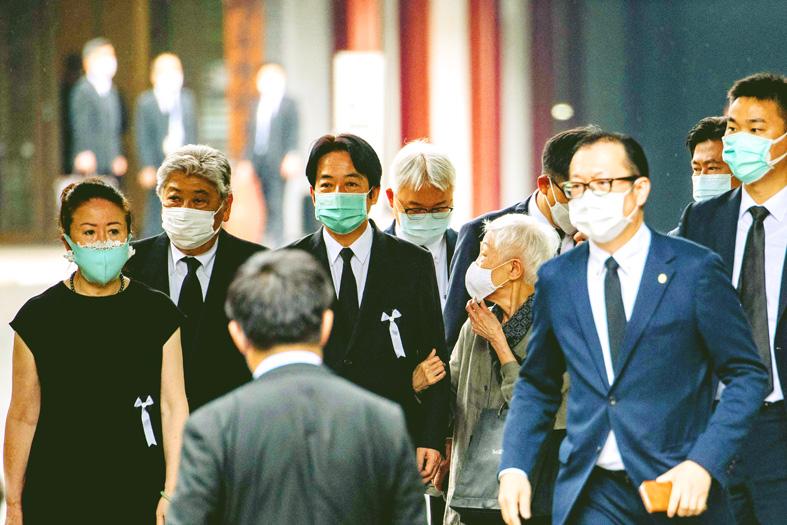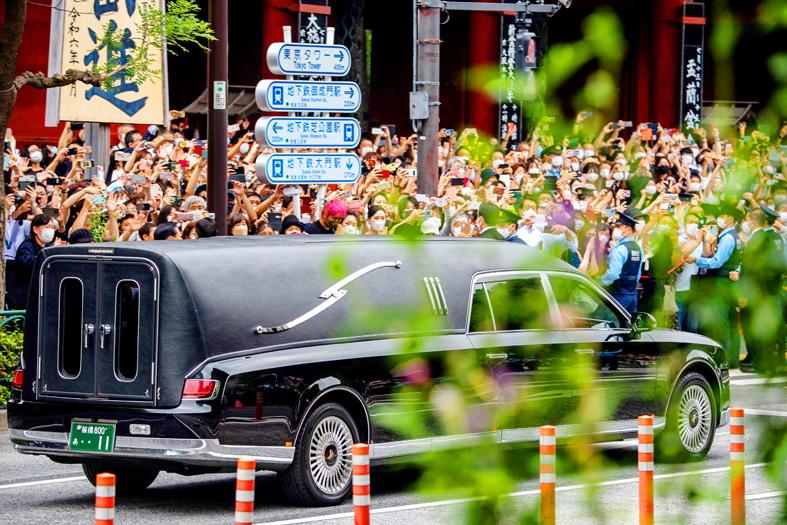Mourners yesterday lined the streets of central Tokyo to bid farewell to assassinated former Japanese prime minister Shinzo Abe, as his hearse was driven past political landmarks after a private funeral.
The nation’s longest-serving prime minister was gunned down on Friday while campaigning, in a crime that rattled Japan and prompted an outpouring of international condemnation and grief.
His funeral was held at Tokyo’s Zojoji temple, with relatives, foreign dignitaries and close acquaintances in attendance, including Vice President William Lai (賴清德).

Photo: AFP
Elsewhere in the temple compound, thousands of well-wishers lined up in the humid heat to pay their respects before a photograph of the late leader, who held office until 2020.
“I can’t get over my sadness, so I came here to lay flowers,” said consultant Tsukasa Yokawa, 41, describing Abe as “a great prime minister who did a lot to elevate Japan’s presence” globally.
After the service, a hearse carrying Abe’s body departed for a final tour of some of the political landmarks he served in: the parliament, the prime minister’s office and the headquarters of the ruling Liberal Democratic Party (LDP).

Photo: AFP
Residents gathered along the route, while staff and officials, including ministers and senior LDP figures, stood somberly outside each venue. They pressed their hands together and bowed their heads in respect as the car arrived.
Abe’s widow, Akie, sat in the front of the hearse — carrying her husband’s mortuary tablet inscribed with his posthumous Buddhist name — and bowed back.
Japanese Minister of Defense Nobuo Kishi, Abe’s brother, called the killing “an act of terrorism.”
“I’ve lost my brother. At the same time, Japan has lost an irreplaceable leader,” he wrote on Twitter yesterday. “My brother loved Japan and risked his life to be a politician and protect this nation.”
In a speech at the funeral, Japanese Deputy Prime Minister Taro Aso recalled drinking and playing golf with his close ally.
“You were supposed to read an eulogy for me. This is very painful,” he said, according to Japanese media.
Abe was campaigning in the western city of Nara when he was shot.
The murder suspect, 41-year-old Tetsuya Yamagami, is in custody and has told police he targeted Abe because he believed the politician was linked to an organization he resented.
Yamagami approached him from behind in broad daylight, in circumstances that have raised questions about security.
Japanese National Public Safety Commission Chairman Satoshi Ninoyu pledged to hold a full review of any security failings.
Japanese Minister of Foreign Affairs Yoshimasa Hayashi said that more than 1,700 condolence messages had been received from 259 countries, territories and international bodies.
On Monday, US Secretary of State Antony Blinken made an unscheduled stop in Tokyo to pay tribute to Abe, describing him as a “man of vision.”
Lai also traveled to Japan, attending a wake for Abe at a Buddhist temple in Tokyo on Monday evening and the private funeral at Zojoji yesterday.
He was scheduled to return to Taiwan last night.
Taiwanese and Japanese authorities have downplayed Lai’s visit, saying he had traveled to Tokyo in a personal capacity.
The Chinese Ministry of Foreign Affairs yesterday said its embassy in Japan had lodged “stern representations” with the government there about Lai attending the event, saying his visit to Japan was a “political trick that will not succeed.”
Hayashi told a press conference that Lai attended Abe’s funeral as a private citizen, adding that Tokyo’s policy toward Taipei had not changed.
In Taipei, Ministry of Foreign Affairs spokeswoman Joanne Ou (歐江安) said the ministry would not comment on Lai’s “private itinerary” in Tokyo.
Democratic Progressive Party (DPP) caucus director-general Cheng Yun-peng (鄭運鵬) said that while Taiwan and Japan have said that Lai visited Japan in a personal capacity, there is no doubt that his status as vice president makes him the envoy of Taiwan.
DPP caucus secretary-general Chen Ou-po (陳歐珀) added that Taiwan’s relations with Japan are deep-rooted and the two nations share a close bond — like close friends, or one might even say family.
That both Taiwan’s ruling and opposition parties have paid tribute to Abe shows that the late prime minister was Taiwan’s best friend and Taiwan-Japan relations are a very important link in the nation’s diplomatic policy, Chen said.
Additional reporting by CNA, Reuters and Hsieh Chun-lin

CHAOS: Iranians took to the streets playing celebratory music after reports of Khamenei’s death on Saturday, while mourners also gathered in Tehran yesterday Iranian Supreme Leader Ayatollah Ali Khamenei was killed in a major attack on Iran launched by Israel and the US, throwing the future of the Islamic republic into doubt and raising the risk of regional instability. Iranian state television and the state-run IRNA news agency announced the 86-year-old’s death early yesterday. US President Donald Trump said it gave Iranians their “greatest chance” to “take back” their country. The announcements came after a joint US and Israeli aerial bombardment that targeted Iranian military and governmental sites. Trump said the “heavy and pinpoint bombing” would continue through the week or as long

TRUST: The KMT said it respected the US’ timing and considerations, and hoped it would continue to honor its commitments to helping Taiwan bolster its defenses and deterrence US President Donald Trump is delaying a multibillion-dollar arms sale to Taiwan to ensure his visit to Beijing is successful, a New York Times report said. The weapons sales package has stalled in the US Department of State, the report said, citing US officials it did not identify. The White House has told agencies not to push forward ahead of Trump’s meeting with Chinese President Xi Jinping (習近平), it said. The two last month held a phone call to discuss trade and geopolitical flashpoints ahead of the summit. Xi raised the Taiwan issue and urged the US to handle arms sales to

BIG SPENDERS: Foreign investors bought the most Taiwan equities since 2005, signaling confidence that an AI boom would continue to benefit chipmakers Taiwan Semiconductor Manufacturing Co’s (TSMC, 台積電) market capitalization swelled to US$2 trillion for the first time following a 4.25 percent rally in its American depositary receipts (ADR) overnight, putting the world’s biggest contract chipmaker sixth on the list of the world’s biggest companies by market capitalization, just behind Amazon.com Inc. The site CompaniesMarketcap.com ranked TSMC ahead of Saudi Aramco and Meta Platforms Inc. The Taiwanese company’s ADRs on Tuesday surged to US$385.75 on the New York Stock Exchange, as strong demand for artificial intelligence (AI) applications led to chip supply constraints and boost revenue growth to record-breaking levels. Each TSMC ADR represents

Pro-democracy media tycoon Jimmy Lai’s (黎智英) fraud conviction and prison sentence were yesterday overturned by a Hong Kong court, in a surprise legal decision that comes soon after Lai was jailed for 20 years on a separate national security charge. Judges Jeremy Poon (潘兆初), Anthea Pang (彭寶琴) and Derek Pang (彭偉昌) said in the judgement that they allowed the appeal from Lai, and another defendant in the case, to proceed, as a lower court judge had “erred.” “The Court of Appeal gave them leave to appeal against their conviction, allowed their appeals, quashed the convictions and set aside the sentences,” the judges